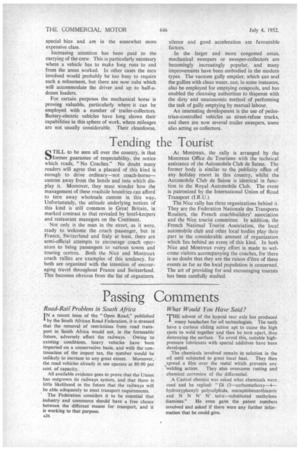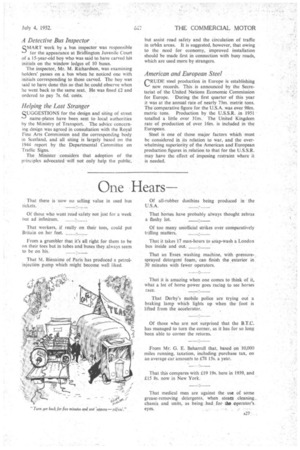Passing Comments
Page 28

Page 29

If you've noticed an error in this article please click here to report it so we can fix it.
Road-Rail Problem in South Africa
IN a recent issue of the "Open Road," published by the South African Road Federation, it is stressed that the removal of restrictions from road transport in South Africa would not, in the forseeable future, adversely affect the railways. Owing to existing conditions, heavy vehicles have been imported on a conservative basis, and with the continuation of the import tax, the number would be unlikely to increase to any great extent. Moreover, the road vehicles already in use operate at 80-90 per cent. of capacity.
All available evidence goes to prove that the Union has outgrown its railways system, and that there is little likelihood in the future that the railways will be able adequately to meet transport requirements.
The Federation considers it to be essential that industry and commerce should• have a free choice between the different means for transport, and it is working to that purpose.
A26
What Would You Have Said?
THE advent of the hypoid rear axle has produced I many headaches for oil technologists. The teeth have a curious sliding action apt to cause the high spots to weld together and then be torn apart, thus destroying the surface. To avoid this, suitable highpressure lubricants with special additives have been developed.
The chemicals involved remain in solution in the oil until subjected to great local heat. They then spread a film over the metal which prevents any welding action. They also overcome rusting and chemical corrosion of the differential.
A Castrol chemist was asked what chemicals were used and he replied: "Di (3—carbomethoxy-4— hydroxyphenyl) polysulphide, mecaptobenzothiazole and N N N' N' tetra—substituted methylene
diamines." He even gave the patent numbers involved and asked if there were any further information that he could give.
A Detective Bus Inspector
MART work by a bus inspector was responsible for the appearance at Bridlington Juvenile Court of a 15-year-old boy who was said to have carved his initials on the window ledges of 10 buses.
The inspector, Mr. M. Richardson, was examining holders' passes on a bus when he noticed one with initials corresponding to those carved. The boy was said to have done this so that he could observe when he went back to the same seat. He was fined £2 and ordered to pay 7s. 6d. costs.
Helping the Lost Stranger
qUGGESTIONS for the design and siting of street name-plates have been sent to local authorities by the Ministry of Transport. The advice concernitig design was agreed in consultation with the Royal Fine Arts Commission and the corresponding body in Scotland, and all siting is largely based on the 1944 report by the Departmental Committee on Traffic Signs.
The Minister considers that adoption of the principles advocated will not only help the public, but assist • road safety and the circulation of traffic in urban areas. It is suggested, however, that -owing to the need for economy, improved installation should be made first in connection with busy roads, which are used more by strangers.
American and European Steel
CRUDE steel production in Europe is establishing new records. This is announced by the Secretariat of the United Nations Economic Commission for Europe. During the first quarter of this year it was at the annual rate of nearly 73m. metrie tons. The comparative figure for the U.S.A. was over 98m. metric tons. Production by the U.S.S.R. in 1951 totalled a little over 31m.. The United Kingdom rate of production of over 16m. is included in the European.
Steel is one of those major factors which must be considered in its relation to war, and the overwhelming superiority of the American and European production figures in relation. to that for the U.S.S.R. may have the effect of imposing restraint where it is needed.
























































































